15 Pantry Staples You've Been Storing Wrong This Entire Time
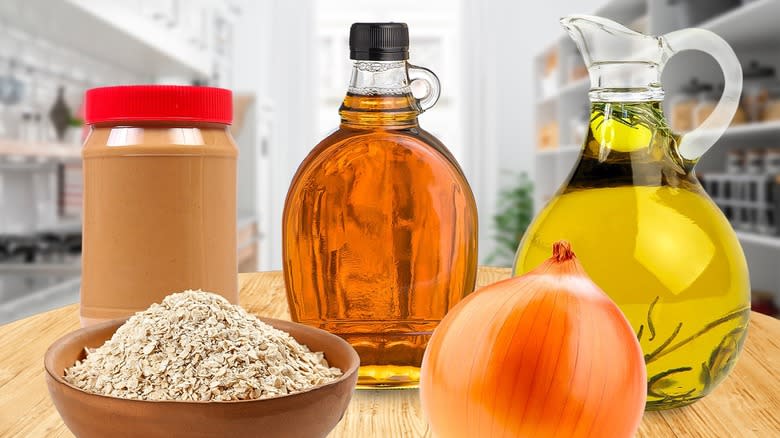
A well-stocked pantry is a thing of beauty, but there is such a thing as too well-stocked. If your pantry is jam-packed to the rafters, it can make it hard to keep track of what's in there, not to mention how fresh it is. You might even be storing certain staple items improperly -- or keeping things in your pantry that shouldn't be kept there at all.
From olive oil to maple syrup and peanut butter to dried fruit, storing your various pantry staples the right way can extend their shelf lives and ensure they're still fresh when you need them. And yes, sometimes that means storing them in the fridge or freezer rather than the pantry, depending on the climate you live in.
We've probably all been guilty of storing some pantry staples incorrectly -- which of these pantry staples might you have been storing wrong this entire time?
Read more: The Best Kitchen Gadgets You Can Buy
Flour
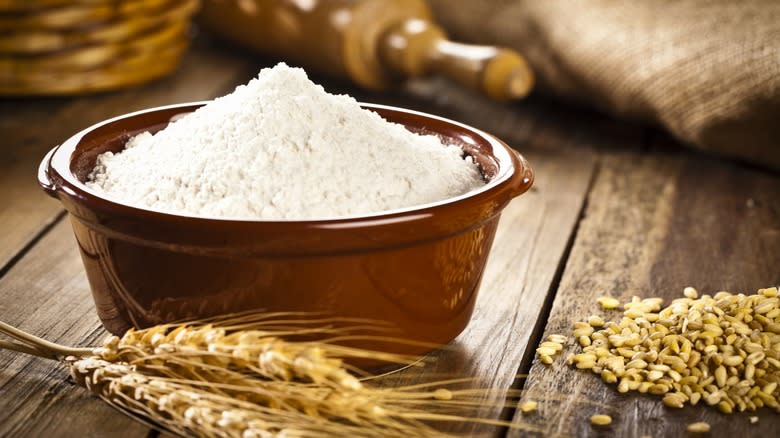
What do you do with the bag of flour you just brought home from the store? If, like many of us, you just pop it in your pantry, stop right there! This isn't a great idea, for a number of reasons.
If your pantry is cool and dark, your flour will probably be okay. Opened bags of white flour will keep up to eight months in the pantry. However, it's still best to decant your flour into an airtight container to keep it fresh and safe from pests.
If you don't bake very often, did you know that you could store your flour in your refrigerator or freezer to extend its shelf life? While this isn't the best bet for all-purpose flour, which is best stored in a dry environment, alternative flours and whole-grain flours last longer when refrigerated or frozen. An opened bag of flour will last for around three months in the freezer or refrigerator. Make sure to store your flour in appropriate fridge or freezer-safe containers, and let it come to room temperature before using it for baking.
Peanut Butter
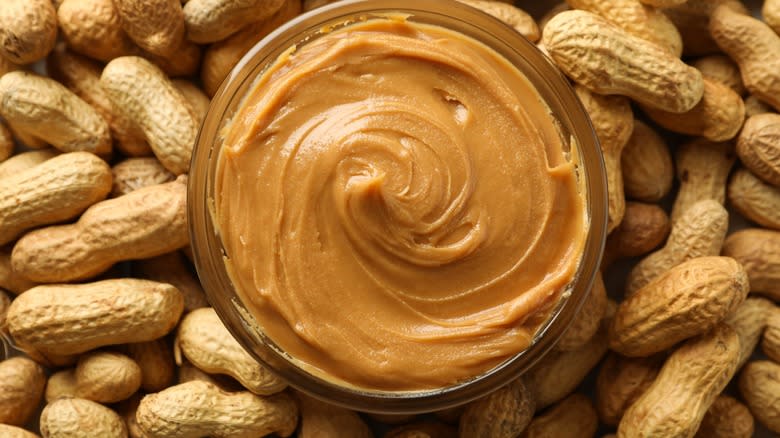
Peanut butter is a pantry staple most of us have handy, whether you use yours to make PB&J sandwiches or add a spoonful to your morning oatmeal. Most brands of peanut butter don't have much moisture, are rich in fat, and are considered shelf-stable. But natural varieties that only contain peanuts and salt might not thrive in the pantry as they don't contain any preservatives.
If you've got a suspiciously old jar of peanut butter lurking in your pantry — though, let's face it, peanut butter usually doesn't stick around too long once it's opened in most households — it might be time to chuck it. Most brands will keep for six to 24 months unopened, in your pantry, provided it's cool and dry — though always check the use-by date. Once that jar is opened, though, expect it to last around two to three months in the pantry. Refrigerating it can add a few months to the shelf life — that's if you don't finish it before then.
While keeping your peanut butter in the pantry isn't wrong, per se, it might be best to refrigerate it after opening if you normally take more than a couple of months to get through a jar. Likewise, if you prefer natural peanut butter brands without any preservatives, the refrigerator is probably the best place to keep your peanut butter once it's opened.
Sugar
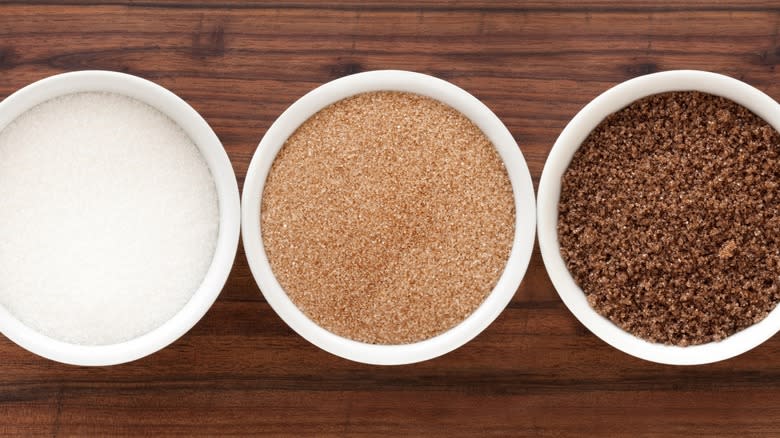
Chucking an opened bag or box of sugar — whether it's white, brown, demerara, or another variety — in your pantry is okay provided it's cool and dry in there, but we'd recommend storing your sugar in an airtight container compared to the original packaging. If you've been storing your sugar in the original bag, you're not alone. Many of us pop a clip or seal on the bag and forget about it, but any moisture in your pantry could permeate the packaging, leading to lumpy sugar. A mason jar or cereal keeper is a much better alternative.
Sugar gone hard? Don't panic. You can add a small piece of bread or a slice of apple to the container and seal it overnight. Any moisture in the bread or apple will help to soften the sugar. Did you know that brown sugar is more prone to hardening than white? You'll find brown sugar keepers made from terracotta which are ideal to help your sugar retain the right amount of moisture.
Sugar can be stored opened in your pantry for 18 to 24 months. It will never spoil, but is at its best when used within 24 months.
Rice
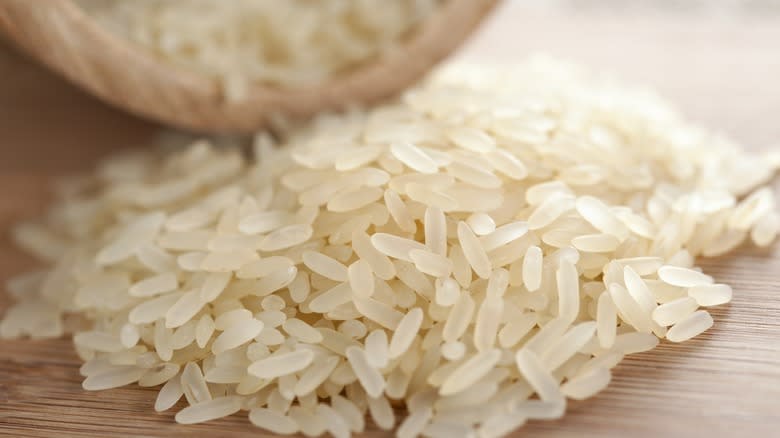
There's a reason rice is such a popular pantry staple. Well, a few reasons. It's both affordable and a great way to bulk out meals, and white rice has an almost indefinite shelf life when stored properly. However, many of us don't realize that storing rice in the bag it comes in isn't the best way to keep it. Instead, try storing your rice in a vacuum-sealed container or mason jar in your pantry.
The shelf life of your rice depends on the type you purchase, too. Whole grain or brown rice has a shorter shelf life than white rice, due to the natural oils contained in the bran layer. It will keep for around six months once opened. However, you can extend its shelf life significantly by storing it in the freezer or refrigerator. Just let it come to room temperature before using in all your favorite dishes.
Lentils And Beans
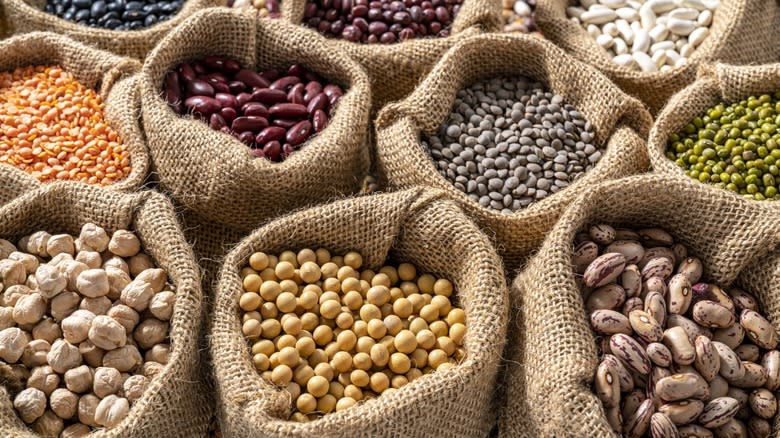
Dried lentils and beans — including garbanzo beans (chickpeas), kidney beans, and pretty much any other type of bean you can think of — can be kept safely in your pantry or cupboard. They can be stored for around a year, provided it's cool and dry. Even after you've opened them, you can continue to store them in your pantry for up to a year.
However, to avoid bugs or mice eating your beans or lentils, it's better to decant them into an airtight container. Doing so could keep the beans fresh for up to three years, although they may be past their best and have lost some of their vitamins. A clear glass container is ideal, so you can see what you're storing -- don't forget to label your containers with the date, so you know how long the contents of each will last.
You can also store your beans and lentils in the freezer, to prolong their shelf life. Again, decant them into suitable freezer-safe containers before storing them. In the freezer, they'll last indefinitely, ready to use in all your recipes.
Dried Fruit
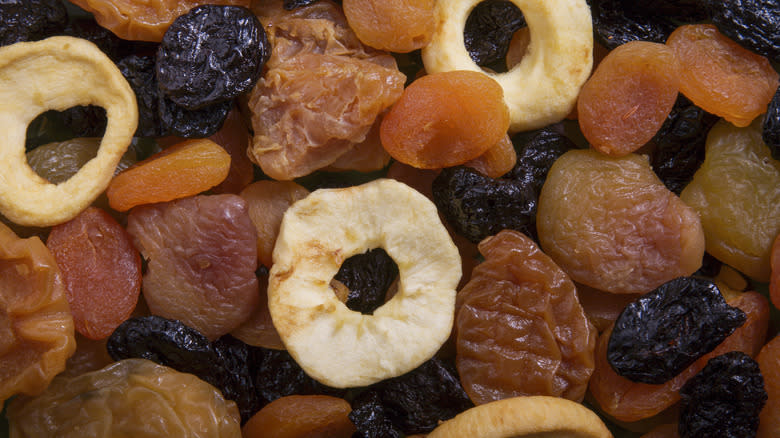
If you don't often eat or use dried fruit in your recipes, you might find it has gone hard when you take it out. One way to avoid this is to use the same terracotta storage pots that can be used to store brown sugar. These pots help retain the right amount of moisture, keeping dried fruits like cranberries, raisins, and apricots perfectly plump, soft, and chewy. If you don't have or can't get your hands on one, an airtight glass container in a cool, dark, dry place works as a great alternative.
Dried fruit can be kept in the pantry for around a month once opened. That's provided your pantry is cool and dark, not in direct sunlight or next to a heat source such as a stove, for example. You could also store your dried fruit in the fridge for up to six months or up to 12 months in the freezer. Don't forget to label your containers so you can keep track of how fresh things are.
Salt
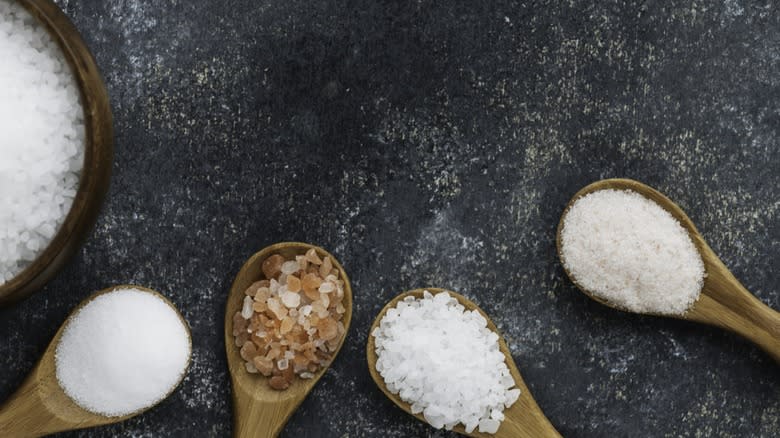
From table salt to kosher salt, garlic salt to Himalayan salt, there are many different types of salt to choose from, but they all have one thing in common: They're best stored in an airtight container. The container you buy salt in at the store can be a surefire recipe for clumpy salt. That's because salt is hygroscopic, meaning it absorbs water from the environment, resulting in clumps.
A ceramic or clay container is an ideal storage vessel for your salt, as is a mason jar with a plastic lid. You should never use a metal container to store salt, as it will rust. You could use a mason jar with a metal lid, but make sure to add a piece of parchment between the lid and the jar to prevent rusting.
Pure salt without any additives can be stored in this way indefinitely, and it won't ever go bad. Just make sure to keep your container(s) of salt in a cool, dark environment.
Coffee And Tea
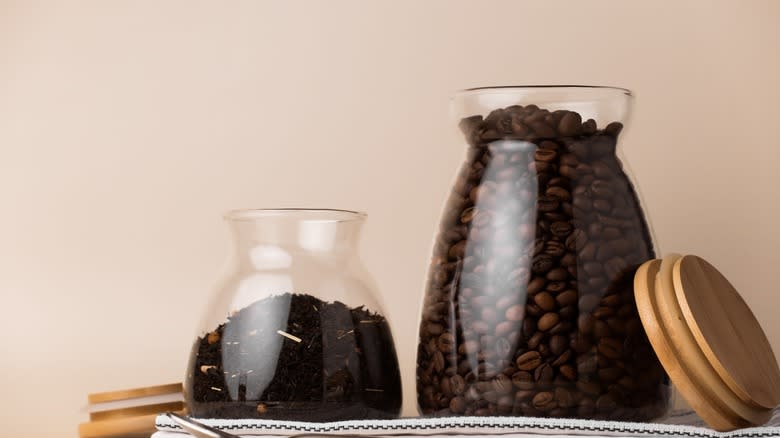
Who doesn't love a morning brew? Many of us already store our tea and coffee in containers other than their original packaging, but did you know that stashing your tea and coffee in the boxes or bags from the store is a big no-no? It's essential to protect tea and coffee from air and light so they don't lose flavor. A tin with a tight-fitting lid is ideal for tea. For coffee, investing in a specialized coffee container with a one-way gas valve to release the carbon dioxide coffee beans produce after roasting is best.
Ground coffee will keep for around two weeks in a cool, dark pantry once opened. If you decide to keep your coffee in the fridge, it should keep for up to a month after opening. However, note that storing coffee in the fridge, or near other products with strong odors — such as spices — could result in the coffee absorbing some of those odors. Keeping your coffee in the fridge could also cause it to go stale.
Should you freeze coffee? Coffee will keep for up to 12 months in the freezer, and some people definitely do this. It's not a great idea if you're particular about your coffee, though. The natural oils in the beans don't react well to freezing, which could result in a strange-tasting cup of joe.
Oatmeal
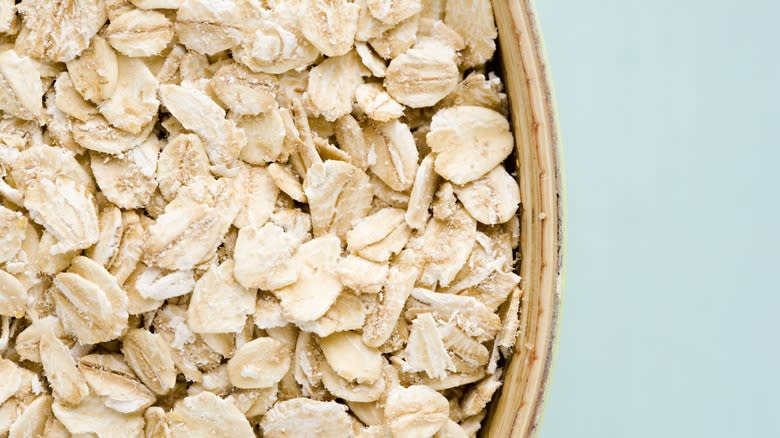
A bag of oatmeal is a great pantry staple to whip up a hearty breakfast or add to smoothies. If your family goes through oatmeal quickly, it's probably fine to keep it in the original bag or container in your pantry, with a clip or seal, if necessary. However, if you plan to store your oatmeal long-term, popping it into a mason jar keeps it safe from rodents and insects and will ensure it stays fresh.
Once opened, oatmeal will keep for up to a year, so don't forget to label your jar. You can also store oatmeal in the fridge or freezer, in a jar or plastic bag. In the freezer, it'll also keep for up to 12 months. Note that the best-before date on oatmeal doesn't mean it's unsafe to eat after this date, provided it's been properly stored, according to Michigan State University. If your oatmeal looks, and smells, okay and has been stored in a proper container, it's likely fine to use, even a few months after the best-before date.
Olive Oil
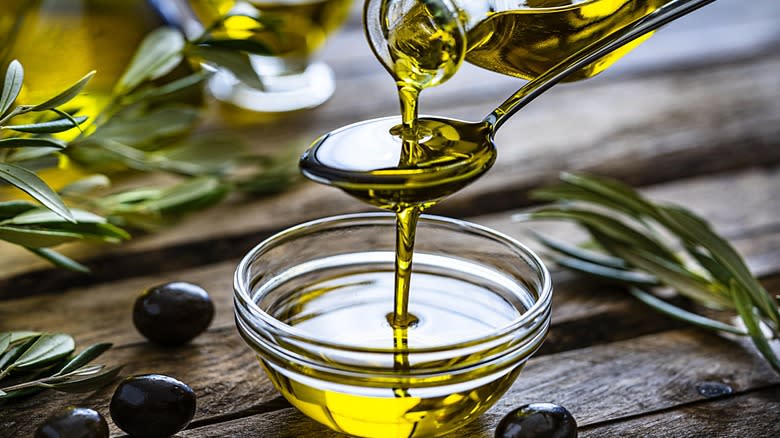
Olive oil, particularly a good-quality extra-virgin oil, can be expensive, so you want to be sure you're storing this pantry staple correctly to keep it at its best. Anywhere dark, dry, and cool works — like a pantry or cupboard. It can be tempting to leave olive oil out on your countertop or near your stove for cooking. However, the heat is bad news for your oil.
In fact, light, heat, and air will all degrade your olive oil. Using rancid oil in your cooking will ruin even the tastiest dishes. Storing olive oil in an area exposed to sunlight could also break down the monounsaturated fats and polyphenols that make this oil such a healthy choice.
When stored properly, an unopened bottle of olive oil should keep for up to 12 months in your pantry. Once opened, it should keep for between three and five months. If your pantry or cupboard is especially cold, you may see white bits floating in your olive oil. These are just solidified lumps of oil — they're not harmful, and they won't affect the oil's flavor.
Onions
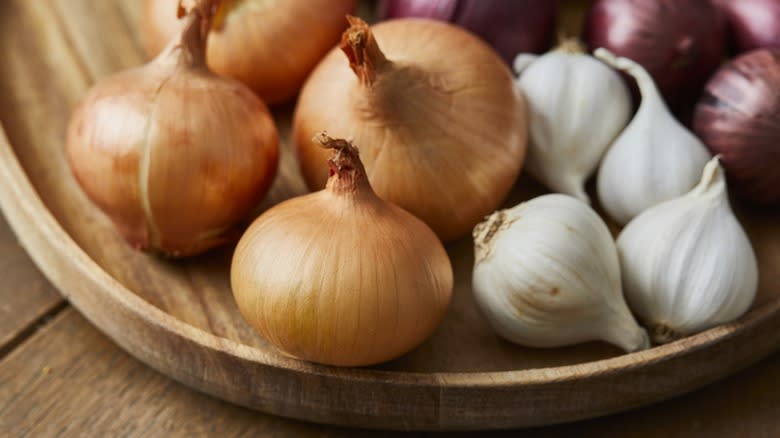
The refrigerator seems like a great place to store onions, right? Well, perhaps not. It turns out, the pantry might be a better place to keep them after all. In a cool, dark pantry or cupboard, your onions could last for around a month. Stored in the fridge, they could last up to two months but may turn soft as they absorb moisture from their environment.
The fridge or the pantry are better options than storing your onions on the counter, though. If your kitchen is particularly warm, your onions could turn bad after two to four weeks, and if they turn without you noticing, you could be left with a particularly smelly mess to clean up, or, worst-case scenario, stained wooden counters.
You could always pop your onions in the freezer if you want to store them for longer. There's some prep involved, though. Peeling and slicing or chopping your onions before storing them in a freezer bag or airtight container means they'll last for up to eight months in the freezer. You can freeze cooked onions in a suitable container for up to a year.
Nuts
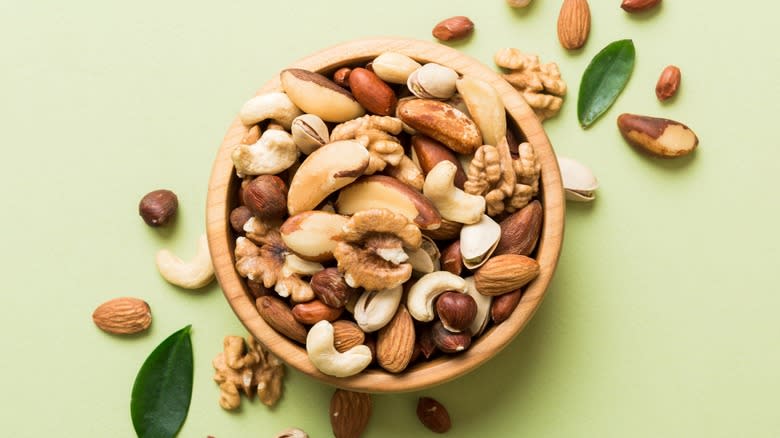
You'd be forgiven for thinking that nuts are easy to store, but as it turns out, that's just not true. Nuts can actually be surprisingly tricky to store optimally. While throwing an opened bag with a clip or tie on it into your pantry is tempting, nuts absorb odors from other foods, so keeping them in an airtight container works best.
Whether you're storing cashews, pecans, walnuts, peanuts, or any other kind of nuts, keeping them cool is a must. If you live in a warm climate or your home is particularly warm, your nuts could go rancid due to their natural oils. This means they might only last for a couple of weeks. If possible, you should store your nuts in the fridge or freezer. They'll keep for around a month in a suitable container in the fridge. If freezing nuts, you can either thaw them before using or add them directly to your recipe, depending on what you're making.
Maple Syrup
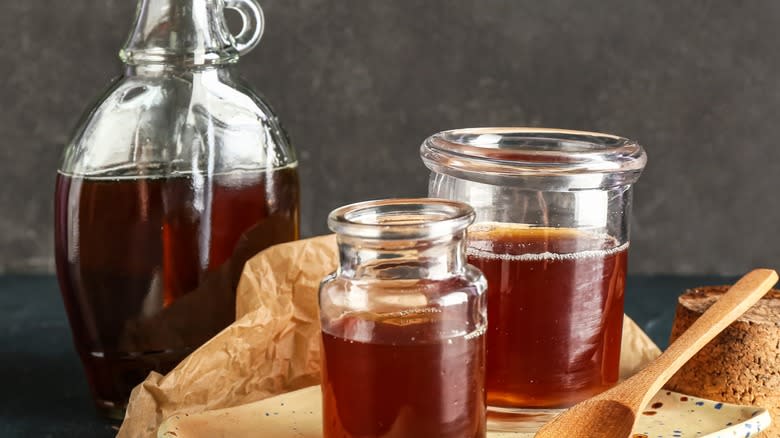
Whether you love it on your oatmeal or drizzled over a pancake stack, maple syrup is one pantry staple many of us always have to hand. But while a plastic container of it will keep unopened in your pantry for up to two years, once you've opened it, it needs to be stored somewhere much cooler.
The refrigerator or freezer is the best place to store an open bottle of maple syrup. In these cool conditions, it should still keep for up to two years, provided you store it in an airtight container. Though, let's face it, maple syrup is usually long gone before then!
One thing you might find when storing your maple syrup in the fridge or freezer is that it a layer of crystallized sugar forms around the cap, making it difficult to open. Just run some hot (not boiling) water around the top of the bottle to melt the sugar, and you're good to go.
A word of warning: If you store your maple syrup for too long at room temperature, it could develop a film of mold, according to Ohio State University. Don't ever just scoop this out and continue using it. Sadly, there's no saving your syrup if this happens, and it will need to be binned.
Potato Chips
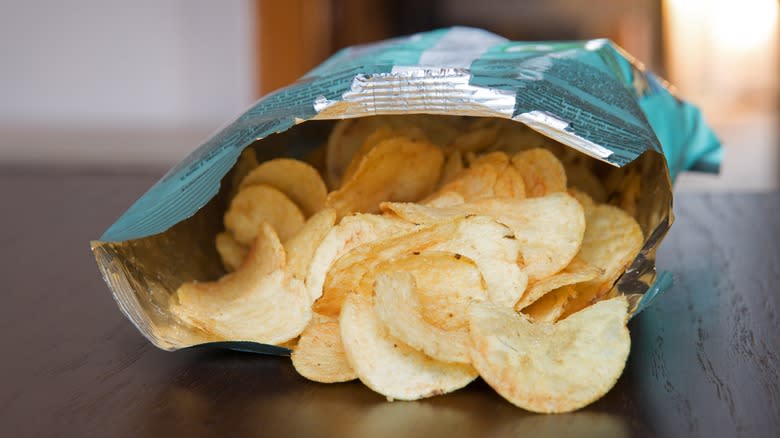
On those rare occasions we don't finish the entire bag of potato chips, most of us keep our opened bags of chips in the pantry. You might be the type of person who stashes their chips in an airtight container, or perhaps you just keep them in the original bag with a clip to seal the freshness in.
In their original bag, opened chips should keep for a couple of weeks, tops. An unopened bag of chips will survive for around two months, or until their use-by date.
It turns out that there's a better way to keep your chips crunchy and delicious. Storing your chips in the freezer makes them last longer, so they won't go soggy or limp! Most bags of chips have labeling suggesting you store them in a cool, dry place. Where could be cooler, or dryer, than your freezer? Stored this way, they'll last for months rather than weeks. Don't forget to use an airtight bag and let your chips come to room temperature before eating them, though.
Baking Soda And Baking Powder
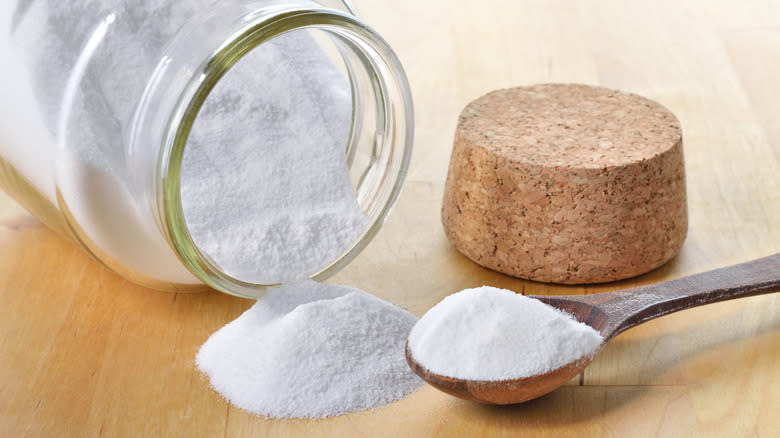
Ah, baking powder and baking soda -- two key ingredients to make pancakes, bread, and cakes light and fluffy. Without them, you'll suffer from soggy, dense baked goods, which nobody wants. Sadly, baking powder and baking soda aren't always sold in the best containers for storage.
The containers these pantry staples come in from the store aren't airtight, and when air gets in, it could spoil their leavening effects. Your best bet is to store your baking powder and baking soda in an airtight container, ideally glass. There's another reason not to store baking soda in the box it comes in, too. It's a natural deodorizer, meaning it absorbs odors from its environment. That could result in it absorbing cooking odors from your kitchen or spice odors from your pantry, which could then transfer to your baked goods.
Stored in an airtight container, baking powder and baking soda should keep for up to six months in the pantry. Always check the use-by or best-before date before using, as if your baking soda or baking powder has expired, they might not work as well as you expected.
Read the original article on Daily Meal.
